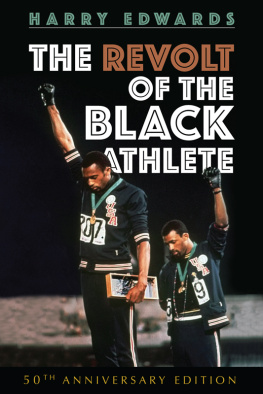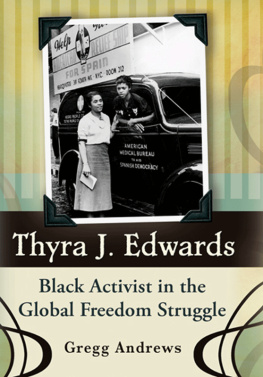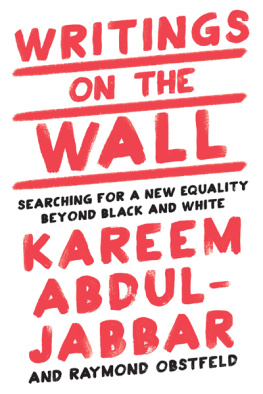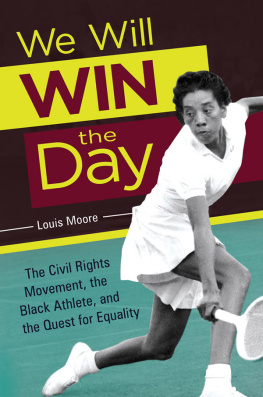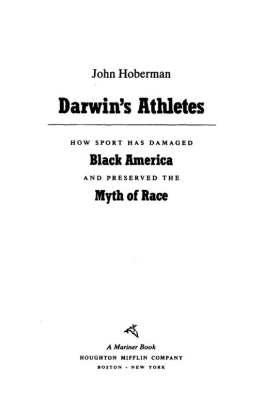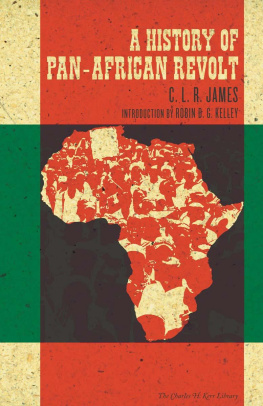The Revolt of the Black Athlete
S PORT AND S OCIETY
Series Editors
Randy Roberts
Aram Goudsouzian
Founding Editors
Benjamin G. Rader
Randy Roberts
A list of books in the series appears at the end of this book.
The Revolt of the
Black Athlete
50th Anniversary Edition
HARRY EDWARDS
With a New Introduction
and Afterword
1970, 1969 by The Free Press
2017 by the Board of Trustees
of the University of Illinois
Reprinted by arrangement with the author.
The Library of Congress cataloged the cloth edition as follows:
Names: Edwards, Harry, 1942 author.
Title: The revolt of the Black athlete / Harry Edwards.
Description: 50th anniversary edition. | Urbana : University of Illinois Press, 2017. | Series: Sport and society | Includes bibliographical references and index.
Identifiers: LCCN 2017000461 | ISBN 9780252041075 (hardback)
Subjects: LCSH : African American athletesHistory20th century. | African American athletesPolitical activityHistory20th century. | African American athletesSocial conditions. | SportsSocial aspectsUnited States History20th century. | SportsPolitical aspectsUnited StatesHistory20th century. | SportsUnited StatesHistory20th century. | Discrimination in sportsUnited StatesHistory20th century. | BISAC: SOCIAL SCIENCE / Ethnic Studies / African American Studies. | SPORTS & RECREATION / History. | HISTORY / United States / 20th Century.
Classification: LCC GV 583 . E 36 2017 | DDC 796.089/96073dc23 LC record available at https://lccn.loc.gov/2017000461
Paperback ISBN 978-0-252-08406-5
Contents
Dedication
In Memory of Muhammad Ali, 19422016
I first met him just before my freshman year at San Jose State. Alithen Cassius Claywas training for the 1960 Rome Olympics and the boxing coach, Julie Menendez, was also the boxing coach at San Jose State. Both Julie and I were from East St. Louis, Illinois, and he invited me over to meet some of the boxers, especially the younger ones. (Ali was born in January of 1942, I was born in November of that same year). Julie warned me that he couldnt stop Clay from talking, and he was right. Upon meeting him, I thought at the time that Cassius Clay was nuts. Of course, he wasnt nuts, just an extremely talented, brashly confident, wonderfully unique and iconoclastic personality, especially for a Negro athlete in those times. There was no way that I couldve anticipated that our paths would intersect as they ultimately did over the years or the auspices under which that would happen. And now it is done.
It is only when a giant passes from among us and we stand blurry-eyed and blinking in the glaring reality of our loss that we come truly to appreciate the extent to which we all really had just been living in his shadow. So it is with Muhammad Ali. Though it is too early to tell what the full scope and significance of his life contributions have been, some aspects of his legacy are already evident: he was an athlete of unparalleled brilliance, beauty, and bravado at a time when Black athletes (other than the Globetrotters) were expected to be seen, not heardsilent, self-effacing producers, not loquacious, verbose, entertaining performers who attracted attention to themselves. In the broader popular culture, he almost singlehandedly deepened our understanding of religious freedom as something more than an American historical and political clich. He influenced, even provoked people from the most powerful (Dr. Martin Luther King Jr., Robert Kennedy, among others) to the most nave among college students and draft-vulnerable youth in communities across this nation to rethink their positions on the issue of war and peace. He was the model and measure of validity for generations of athletes relative to their activist engagement of issues emerging at the interface of politics and sports, from those activist athletes involved with the Olympic Project for Human Rights in 1968 to the University of Missouri Black football players who threatened a football boycott in support of students protesting against racism on that campus in 2015, to the 2016 kneeling protest gesture of San Francisco Forty Niners quarterback Colin Kaepernick during the playing of the National Anthem, to the call during the 2016 ESPYS Awards show by NBA players LeBron James, Carmelo Anthony, Chris Paul, and Dwyane Wade for less talk and tweets and more activism focused on social issues on the parts of professional athletes, to the Seattle Seahawks locked arms gesture of unity in opposition to injustice in society.
He taught us all by word and example that there can be no for sale sign, no price tag on principles, human dignity, and freedom; and, in fighting both in the boxing ringliterallyand beyond for the legitimacy of his Muslim name, Muhammad Ali, he succeeded in expanding the American cultural acceptance, even the embrace of nontraditional names to the point that a Black man named Barack Hussein Obama could be elected president of the United Statesnot once, but twice. Is Muhammad Ali The Greatest ? Compared to whom, compared to whatof his era or any other? The Greatest, even within the context of what we already know and understand about his lifes journey, does not begin to truly capture the magnitude and significance of his broad scope contributions and legacy.
He stood astride the last four decades of the twentieth century like a bronzed colossus, the most recognizable human face on earthone foot firmly planted in the sports arena, the other in the world beyond, eventually dwarfing all but the most globally illustrious among us in both. His athletic brilliance long since faded, now his very physical presence among us will be missed, but his indomitable spirit of principled courage, commitment, and sacrifice will always be with us because he has so deeply penetrated our perceptions of our potential as a people and validated our most positive visions of what we should and in fact could be as a society and as a nation. It was a blessing and profound privilege to have known him.
Well done, Champ, and Godspeed, my Brother!
Rest in Peace!
Introduction to the
50th Anniversary Edition
During the week of September 22, 1967 (initially with the support of one graduate student, a former athlete, Ken Noel) I organized a rally in protest of institutionally entrenched, demonstrably anti-Black racism and discrimination in the policies, operations, hiring practices, student recruitment patterns, and overall academic and campus culture at San Jose State College (S.J.S.C.)now San Jose State Universityin California. As an S.J.S.C. scholarship athlete and a sociology honor student with an already well-developed interest in relationships at the interface of race, sport, and society, even as an undergraduate I had become keenly aware of the ever-more-central and critical role of the Black athlete in the revenue-producing sports of collegiate football and basketball.
No less importantand against the background ideologies, strategies, and momentum of a full-blown, society-wide movement to compel enforcement of Black peoples civil and human rights across AmericaI had come to understand the unintended, largely unanticipated, and unacknowledged externality of an emergent power potential inherent in the tragically exploitive circumstances and position of the Black collegiate athlete. It was under the auspices of this awareness that I determined to leverage Black athlete power potential as the central strategy of an effort to force progressive institutional change in the circumstances and outcomes of Black people overallincluding Black athletesin relationship to S.J.S.C.

